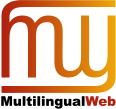Monthly Archives: July 2015
Posts
Linguistic Linked Data for Digital Humanities and Linguistics: 7th LIDER roadmapping workshop in Madrid, October 2015

In the last two years, the LIDER project has organized several roadmapping events to gather a broad community around the topic of linguistic linked data. In October this year, LIDER will engage with two selected communities: linguistics and experts in digital humanities, via a national roadmapping workshop that will take place in Spain. The 7th LIDER roadmapping workshop will focus on these topics and will be held in Madrid at Universidad Politécnica de Madrid. The participation will be free and open. Spanish will be the main language of the event. For more information also about participation please visit the workshop website http://lider-project.eu/workshopMadrid/
Updated Working Draft: Requirements for Chinese Text Layout 中文排版需求
Updates to Requirements for Chinese Text Layout include the following.
- Zhuyin figures updated
- Various graphic examples of annotations added
- New section containing examples of Zhuying annotations
- Aijie Zhang added to list of editors
- Various code fixes and typos corrected
We are in the process of adding Simplified Chinese translations of all the text, but the work is still in progress. All markup created during this process so far has been hidden in this document using CSS. It will be unhidden in a future Working Draft, once the work is completed.
A detailed list of changes, including diffs, can be found in the github commit log.
W3C Workshop Report on the MultilingualWeb workshop in Riga

A report summarizing the MultilingualWeb workshop in Riga is now available from the MultilingualWeb site. It contains a summary of each session with links to presentation slides and minutes taken during the workshop in Riga. The workshop was a huge success. With the parallel Connecting Europe Facility (CEF) event, it had more than 200 registered participants. See a summary of highlights, and a dedicated report about outreach activities of the supporting EU funded LIDER project. The Workshop was locally organized by Tilde, sponsored by the LIDER project and by Verisign. Learn more about the Internationalization Activity.
First Public Working Draft: Requirements for Chinese Text Layout 中文排版需求
The Internationalization Working Group has published a First Public Working Draft of Requirements for Chinese Text Layout (中文排版需求), on behalf of the Chinese Layout Task Force, part of the Internationalization Interest Group.
The document describes requirements for Chinese script layout and text support on the Web and in digital publications. These requirements inform developers of Web technologies such as CSS, HTML, and SVG, and inform browser and tool implementers, about how to support the needs of users in Chinese-speaking communities.
This is still a very early draft and the group is looking for comments and contributions to support the ongoing development of the document.
Updated Working Draft: Requirements for Hangul Text Layout and Typography
Changes in this publication of Requirements for Hangul Text Layout and Typography (한국어 텍스트 레이아웃 및 타이포그래피를 위한 요구사항) are editorial in nature, but significant. The separate English and Korean versions of the document were merged into one page. (You can use buttons at the top right of the page to view the document in one language or the other, if you prefer.)
Merging the languages helps significantly for development and maintenance of the document, for guiding users to a language version they prefer, and for bilingual readers offers additional opportunities.
In addition, the links to issues in the document were changed to point to the github issues list, rather than the former Tracker list.
There were no substantive changes to the English (authoritative) version, but the Korean version was brought into line with earlier changes to the English text.
Updated Working Draft: Indic Layout Requirements
Indic Layout Requirements describes the basic requirements for Indic script layout and text support on the Web and in Digital Publications. These requirements provide information for Web technologies such as CSS, HTML, and SVG about how to support users of Indic scripts. The current document focuses on Devanagari, but there are plans to widen the scope to encompass additional Indian scripts as time goes on.
Changes in the new version relate to initial letter styling in Devanagari text. Editorial changes were also made to bring the document in line with recent changes to the Internationalization Activity publishing process.
Updated Working Draft: Character Model for the World Wide Web: String Matching and Searching
Character Model for the World Wide Web: String Matching and Searching builds upon Character Model for the World Wide Web 1.0: Fundamentals to provide authors of specifications, software developers, and content developers a common reference on string identity matching on the World Wide Web and thereby increase interoperability.
This new version introduces numerous editorial changes as well as replacing some temporary terminology with better terms, and integrating the case folding text from the string matching algorithm into the case folding section. The document template was also adapated to match the new Internationalization publication process. See details of changes.
Additional Requirements for Bidi in HTML & CSS published as Working Group Note
Additional Requirements for Bidi in HTML & CSS was used to work through and communicate recommendations made to the HTML and CSS Working Groups for some of the most repetitive pain points prior to HTML5 and CSS3 for people working with bidirectional text in scripts such as Arabic, Hebrew, Thaana, etc.
It is being published now as a Working Group Note for the historical record in order to capture some of the thinking that lay behind the evolution of the specifications and to help people in the future working on bidi issues to understand the history of the decisions taken. Notes have been added to give a brief summary of what was actually implemented in the HTML or CSS specifications.
W3C® liability, trademark and permissive license rules apply.
Questions or comments? ishida@w3.org